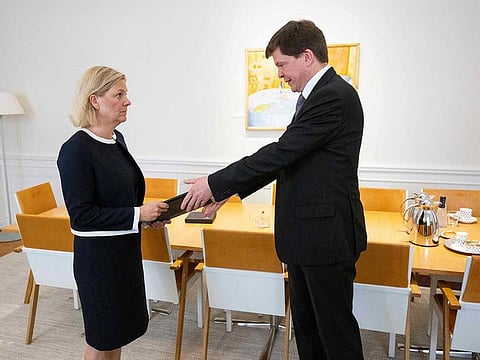Sweden’s right-wing in talks to form government with far-right
Social Democratic Prime Minister Magdalena Andersson tenders resignation

Stockholm: Sweden’s incoming leader got to work Thursday on the thorny task of building a government supported for the first time by the far-right, a day after securing a slim election victory.
Conservative Moderates chief Ulf Kristersson was expected to be formally tasked sometime next week with forming a government after Social Democratic Prime Minister Magdalena Andersson on Thursday tendered her resignation.
While the far-right Sweden Democrats became the biggest party on the right with 20 percent of votes, observers said it was unlikely the anti-immigration and nationalist party would be given cabinet seats due to divisions in the right-wing bloc.
The small Liberal party has said it would withdraw its support for Kristersson - which would leave him without a majority - if he includes the far-right in the government.
With 176 seats - 73 of them going to the far-right Sweden Democrats - the four-party coalition will have a slim majority over Andersson’s left bloc, which won 173.
The narrow majority leaves the right-wing bloc fragile, with the four parties fiercely opposed on a number of issues, especially the Liberals and Sweden Democrats.
A few disgruntled MPs could end up flipping the balance of power in parliament.
The bloc is at odds over international aid, unemployment benefits, asylum laws and legal reforms to staunch a wave of gang shootings and bombings that have rocked Sweden in recent years.
“This is a difficult parliamentary situation,” Gothenburg University political scientist Mikael Gilljam told AFP.
Sweden Democrats leader Jimmie Akesson said on election night that obtaining cabinet posts was the party’s “goal”, but he has also made it clear that he was ready to present a long list of demands in exchange for the party’s informal support outside government.
The party would in such case be able to heavily influence policy without being held accountable, with some analysts suggesting that was actually the far-right’s preferred scenario.
‘Make Sweden great again’
Speaker of parliament Andreas Norlen said Thursday he would summon party leaders for talks next week before assigning Kristersson the task of building a government, opening a period of formal negotiations.
But Kristersson, 58, has already rolled up his sleeves and held meetings with the leaders of the Christian Democrats, Sweden Democrats and Liberals.
“I now begin the work of forming a new and strong government,” Kristersson said on Wednesday evening in a post on Facebook after final vote counting gave his side the win.
“Now we will restore order in Sweden!”
The post of prime minister usually goes to the biggest party in a bloc, but it is expected to go to Kristersson as Sweden Democrats leader Akesson is unable to unite all four parties to head the government.
Never before has a Swedish government relied on the support of the far-right.
The Sweden Democrats rose up out of neo-Nazi groups and the “Keep Sweden Swedish” movement in the early 1990s, entering parliament in 2010 with 5.7 percent of votes.
Long shunned by other parties, they have registered strong growth in each subsequent election, and its hardline stance on crime and integration set the tone in this year’s vote.
Kristersson, a former gymnast, led a major U-turn for his party when he initiated exploratory talks in 2019 with the Sweden Democrats and then deepened their cooperation.
The Christian Democrats, and to a lesser extent the Liberals, later followed suit.
In a post to Facebook on Wednesday, the 43-year-old populist leader Akesson thanked “friends of Sweden” around the country, and noted that negotiating a new government was “a process that will take the time it needs”.
“Now the work begins of making Sweden great again,” he said.
The rise of the far-right has divided parties and voters alike.
“There are a lot of big questions in our society today that in some ways haven’t been addressed correctly and I think that a lot of people have been waiting for a change”, 28-year-old psychologist Axel Lundstrom told AFP.
“It’s scary, it’s strange... We’re seeing an idiocracy winning more and more ground,” 39-year-old art curator Anna Senno said.



